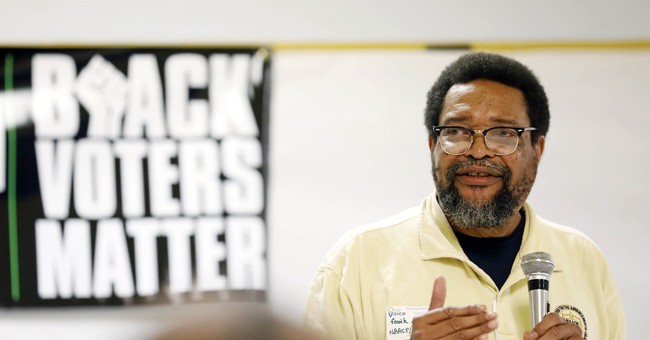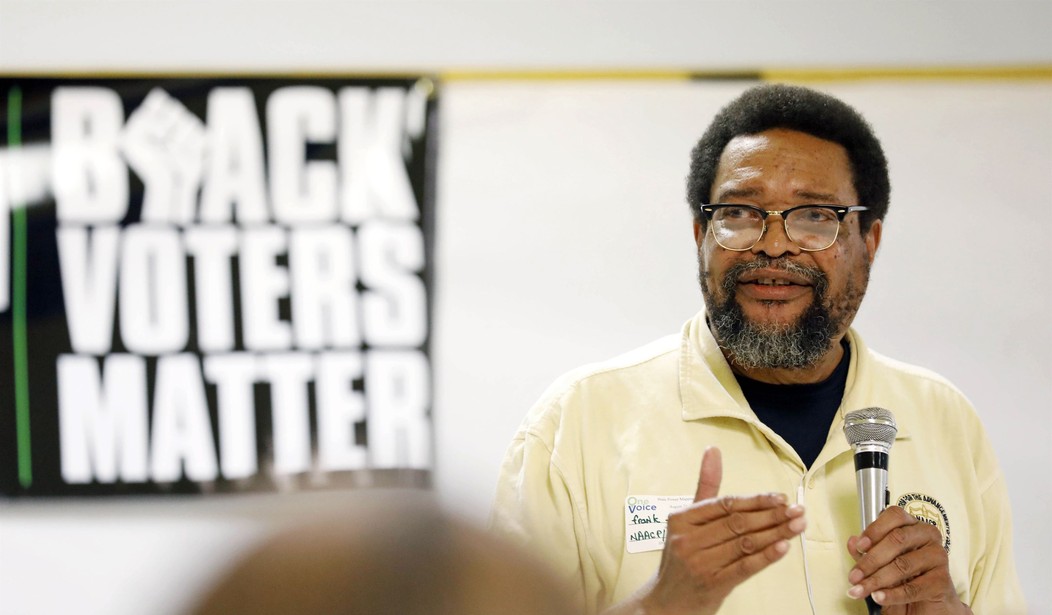
A story in the Chicago Tribune on Sunday has slipped under the radar a bit in all the news of the past few days.
The story lays out in fairly stark terms that from the perspective of African-American community leaders in Detroit, Milwaukee, and Cleveland — three cities where support from African-American voters is a “must” for a Democrat to win statewide in Michigan, Wisconsin, and Ohio — there is disturbingly little visible enthusiasm for the Biden/Harris ticket, and the race turns there on anti-Trump animus, which may be overestimated.
Party leaders and Biden’s African American surrogates in the three cities are projecting confidence that their voter outreach efforts will deliver — despite much of it being relegated to the virtual realm amid the COVID-19 pandemic. The work, they said, only has been energized by Biden’s running mate selection of California U.S. Sen. Kamala Harris, the first Black woman and Asian American named to a major presidential ticket.
So that’s the “official” position of the Democrat party and the Biden campaign. But the reality on the ground in those cities is different, say local African American leaders.
But interviews with more than 60 Black local elected officials, religious leaders, grassroots organizers and voters in visits to all three cities reflect a shakier situation — one where there is often little enthusiasm among African American voters for Biden and prevalent concerns that the campaign has to do more to improve turnout.
Detroit City Council member Mary Sheffield said “there is a disconnect” between the Biden campaign’s optimism on Black turnout and the “lack of excitement, lack of enthusiasm” she’s seeing in her ward on the city’s East Side. “A lot of people have had their eyes opened to the importance of voting, with the death of George Floyd and the civil unrest, but they don’t believe Joe Biden would be the person who would really do anything different,” she said. “A lot of voters I talk to — the younger ones especially — aren’t just going to go out and vote for Biden because he says, ‘If you’re Black, you vote for me.’”
The author of the article tries to make the case that there is an animus felt in the Black community towards the Trump Administration, and this animus will serve to shore up a lack of enthusiasm for Joe Biden. But that case runs contrary to polls showing that while the percentage of Black voters likely to vote for Biden over Trump looks similar to 2016, how many votes from African-Americans that may produce remains a question mark.
The site FivethirtyEight published an interesting study of polling the Black voter demographic back in September, and the conclusions are troubling for the same reasons reflected in the Chicago Tribune article.
The bottom line of the article is that Biden will likely win the African-American vote nationwide by a “normal” spread of 90-10%. The problem is that it only reflects votes cast, and the percentage of votes cast is not the important part of the equation for Biden’s chances in Michigan, Wisconsin, and Ohio — it’s the total number of votes that the 90% number represents. The sentiments of different demographic groups within the Black electorate is the rock upon which the Biden campaign may flounder.
But among Black likely voters, Biden’s biggest margins are among older cohorts. And when you conduct polling among all Black adults … this age gap is even wider… [O]lder Black people support Biden by a wide margin while younger Black people are more supportive of Trump….
Older Black people are more clearly partisan Democrats than younger Black people…. Among Black registered voters age 50 and older, 75 percent said they thought congressional Democrats were doing a good job…. But among Black voters under age 50, only about half (54 percent) approved of congressional Democrats, while 36 percent disapproved. Black voters under 50 (57 percent) were more likely than those 50 and over (40 percent) to agree with the statement, “The Democratic Party takes Black people for granted.”
“Unlike their elders, who came up with fresh memories of civil rights activism, young folks aren’t willing to tolerate voting for the ‘lesser of two evils.’ They told us they would just as soon stay home,” said Sam Fulwood, a fellow at American University’s Center for Congressional and Presidential Studies….
“There is a level of disenfranchisement and disengagement,” he added. Woodbury also argued that some of Trump’s messages have resonated with younger Black voters in particular. In focus groups, according to Woodbury, younger Black voters often mention the criminal justice reform bill that the president signed into law, his support for increased funding for historically Black colleges and the low Black unemployment rate before the coronavirus outbreak.
“A lot of people have had their eyes opened to the importance of voting, with the death of George Floyd and the civil unrest, but they don’t believe Joe Biden would be the person who would really do anything different,” she said. “A lot of voters I talk to — the younger ones especially — aren’t just going to go out and vote for Biden because he says, ‘If you’re Black, you vote for me.’ ”
It is really hard to gauge Black turnout from the polls we have now…. That said, the evidence we have indicates that super-high Black turnout [in 2008 and 2012] was related to the chance to elect and then reelect the first-ever Black president. That is not happening in 2020, so it’s more likely that Black voting patterns will resemble 2004 or 2016 than 2008.
And that takes us back to the Chicago Tribune story about the situation “on the ground” as observed by Black community leaders in Detroit, Milwaukee, and Cleveland.
Cleveland City Councilman Basheer Jones worked as a regional field director in his city for Obama’s 2012 campaign and as a consultant for Clinton’s 2016 campaign, organizing events to engage Black voters. He described Obama’s campaign as a “well-oiled machine” that sent “waves of people who never considered voting” to the polls while “Hillary Clinton took that vote for granted.”
“They just believed there was no way Black people would support Donald Trump,” said Jones…. “But they never made the case on why we needed to support Hillary Clinton. There wasn’t a sense of urgency.”
Jones said he’s seeing slightly more energy around this election — mostly because of deep opposition to Trump.
“I’m not seeing a lot of excitement on the ground here in Cleveland for Joe Biden, unfortunately,” Jones said. “So, at least if you’re not pro-Biden, I’m hoping you’re anti-Trump and that will be enough to bring you out, but I’m just not sure.”
The result has been often low visibility in Black communities where a physical presence in church congregations, corner campaign offices and knocking on doors historically have been viewed as key in connecting with voters who may be harder to reach.
“If you want this community to support you, you need to touch down in a lot of ways in this community,” said Rev. Gregory Lewis,… director of a faith-based grassroots organization that is aiming to boost Milwaukee’s Black turnout by 100,000 voters.
“I know it’s a pandemic, but get people out here with a ton of free yard signs, door hangers, put up some billboards — do something that shows us you want our vote,” Lewis said. “I could go down the street right now and ask someone if they know who Joe Biden is, and they probably won’t know.”
Of particular interest was an event in Detroit organized and run by the founder of “New Era Detroit,” Zeek Williams. Noteworthy was the fact that Joe Biden was a non-issue at the event, which Williams did not apologize about.
One place where the Biden campaign decidedly was not present: New Era Detroit’s recent Meet in the Streetz “Hood Politics” event.
New Era was founded by Zeek Williams with the goal of empowering Black communities through ardent grassroots organizing in the spirit of Malcolm X, Marcus Garvey and Huey P. Newton, a co-founder of the Black Panthers.
During an obscenity-laden speech about the need to improve their community from the inside-out, Williams talked about political accountability and became the first and only speaker all day to mention Biden. He mocked the former vice president for making a brief retail campaign stop last month at the Detroit clothing store Three Thirteen in between events with union workers.
“Just because Joe Biden brings his raggedy a– to the city of Detroit and goes and shops at a black-owned store … I don’t give a f—,” Williams said to laughs. “That don’t make you no different. That’s nothing. What are you talking about?”
In an interview, Williams said Biden stopping for a photo opp “may have worked 10 years ago, but it’s so cliche. The same old politics like that aren’t gonna last much longer. The younger generation is fed up.”
Williams emphasized the need for groups like his to start organizing from the ground up with the smallest political offices. He said he voted for Obama twice, but has since become disenchanted with national politics. He said he didn’t vote in the 2016 presidential race and isn’t sure if he will this year.
Hillary Clinton dramatically underperformed Barack Obama with Black voters in these three cities in 2016 — not in terms of the percentage she won, but rather in terms of the gross number of votes she received.
This is a circumstance where the dynamic at work — more and more younger Black voters not following in lockstep with their parents’ and grandparents’ fealty to the Democrat Party — gets worse for Democrats each election cycle. Each cycle there are fewer older Black voters who lived through the Civil Rights era and more younger Black voters who have favorable views of Pres. Trump or are simply less receptive to the view that they are obligated by their race to support Democrat candidates.
Among all demographics of all races, some voting patterns are ingrained, and won’t change except at the margins from election to election. But Pres. Trump, more so than any GOP President I can remember, has been willing to take his message to a historically unreceptive audience. He has not “accepted” a result of getting only 10% of the Black vote, and is working for 12% as a campaign goal. He’s taken initiatives that have benefited African-Americans that no other Republican — or on many issues no Democrat either — and simply said “I’m doing this because I think it’s the right thing to do.” Were there political calculations involved? I’m sure there were — but there were downside risks for him too, and he did them anyway.
The risk for Joe Biden is not that Donald Trump will capture 20% of the Black vote. The risk for Joe Biden is that Trump will capture 12% of the Black vote — rather than the 9% he won in 2016 — and that Joe Biden’s percentage will be as hollow as Hillary Clinton’s percentage when the total number of Black votes for him are tallied because the Democrat party has lost its iron-fisted grip on the next generation of African-American voters.














Join the conversation as a VIP Member